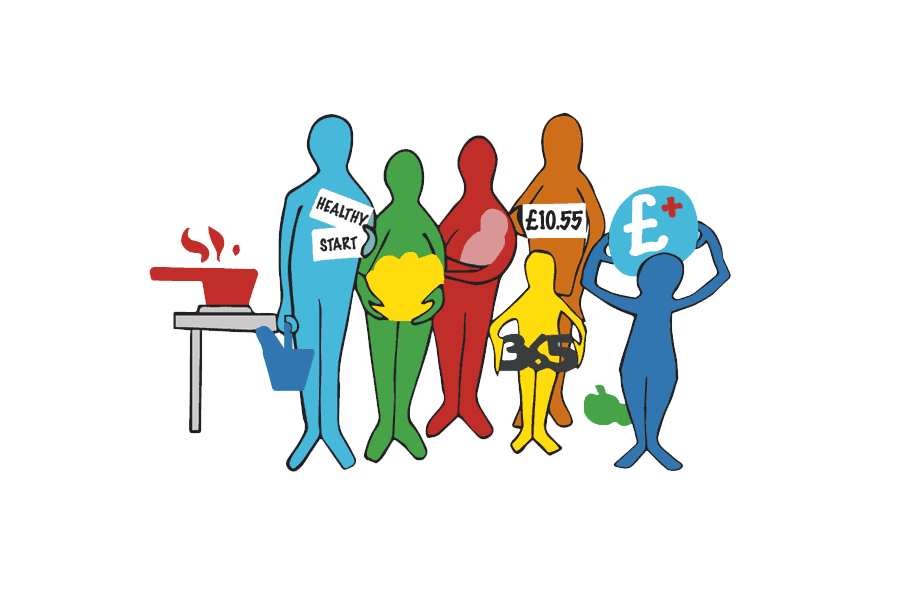What is food poverty?
Food poverty encompasses both the affordability of food and its accessibility within local communities. There is no agreed definition but here are three interpretations that Sustain believes set out the scope of the problem:
‘The inability to afford, or to have access to, food to make up a healthy diet.’
The Department of Health
‘Food poverty is worse diet, worse access, worse health, higher percentage of income on food and less choice from a restricted range of foods.’
Professor Tim Lang
‘The inability to consume an adequate quality or sufficient quantity of food in socially acceptable ways, or the uncertainty that one will be able to do so.’
Professor Elizabeth Dowler
Other terms to describe food poverty include household food insecurity, food insecurity, food vulnerability and hunger. Read more about how to talk about food poverty.
Causes and impact
Food poverty can be triggered by a crisis in finances or personal circumstances. This could include job losses, changes in housing, a delay in receiving Universal Credit, an unexpected expense, or family bereavement. It can also be a long-term experience of not being able to access or have the facilities to prepare a healthy diet. For example, low wages that do not cover the cost of living or a disability that prevents an individual from accessing healthy food as needed.
Once these circumstances have been triggered, food budgets are often the first thing to be cut to accommodate for other vital living costs such as rent and fuel.
Food poverty has multiple negative impacts on individuals’ health and wellbeing, including a higher risk of dietary related illnesses and diseases due to healthy and nutritious food often being more expensive than food high in fat, salt and sugar.
Who is most at risk?
To understand who is at risk we must first know how many people are living in food poverty. 5 million people in the UK lived in food poverty between 2019 – 2020, according to the Governments latest Family Resources Survey. In 2020, this was 8% of the population, but data from The Food Foundation suggests food insecurity levels rose to 9% of the population in January 2021. The Trussell Trust has also seen an increase in food bank use of 123% over the past five years, whilst the Independent Food Aid Network report a rise of 110% between 2019 and 2020.
It’s safe to say that food poverty in the UK is rising, whether it be 8 or 9% of the population, and anyone can be affected. Children who are unable to access free school meals during the holidays; individuals who are using food banks for the first time after a job loss; parents on low incomes who skip meals so their children can eat; older people unable to prepare meals without support, or people with no recourse to public funds who are excluded from most welfare support.
All of these instances are a symptom of inadequate and/or insecure incomes, holes in the welfare safety net, increased living costs, rising debt, and financial problems for households living with disability and mental health issues.
These symptoms don’t affect people equally though. The Governments own figures state that household food insecurity rises from 8% of the population to 19% for Black led households and 41% for households with three or more children. In 2020 analysis found that two in three households referred to a Trussell Trust food bank included one or more disabled people. The Covid-19 outbreak has only exacerbated this disproportionate impact. For example, Bangladeshi (43%) and Black British groups (38%) were most likely to report a loss of income since Covid-19, leaving them vulnerable to household food insecurity.
The need for action
Sustain believes that modern-day hunger is unacceptable, and we are working to end it through projects and campaigns that change policy and practice at the national and local level. Many councils, community groups and others are taking action to ensure people are able to eat and to address the root causes of people’s difficulties.
However, major cuts to local authority budgets, the welfare safety net, and rising fuel, food and housing costs undermine these local efforts. To change this, we need to support local coordination and push government, councils and other statutory organisations to take responsibility for ending hunger. This would ensure local communities are able to access healthy, affordable food in a dignified manner and push governments to rebalance the burden of responsibility that currently falls far too heavily on local actors.
Find out what actions you can take locally and nationally
Food Poverty: Millions of people in the UK struggle to get enough to eat. We’re working to change that through people-powered projects and campaigns that tackle the root causes of food poverty and ensure everyone has dignified access to healthy, affordable food.
